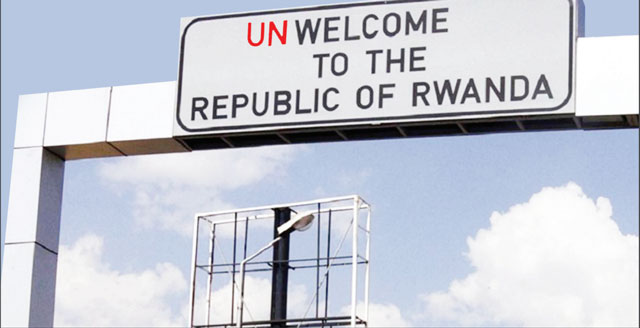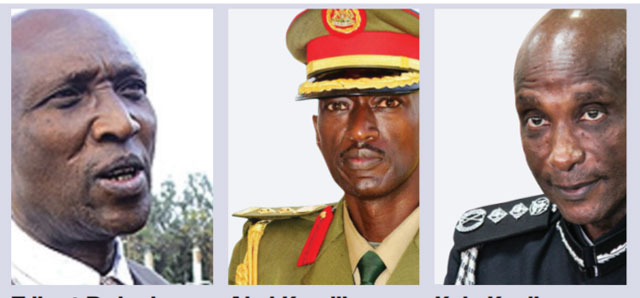
The 7 issues fueling tension between Rwanda, Uganda
Kampala, Uganda | THE INDEPENDENT | Maize floor, potatoes, vegetables, soap, sugar, cement, iron bars. Those are items Rwanda imports from Uganda, according to the latest 2017 figures from the OEC trade atlas. The total worth of Ugandan exports to Rwanda was US$171 million.
Rwanda, on the other hand, exports to Uganda coffee, hides and skins, scrap iron, and molasses. Total value of Rwanda exports to Uganda in 2017 was US$9.4 million.
These goods and numbers have been closely scrutinised since Feb.27 when Rwanda stopped allowing travellers and vehicles from Uganda to cross the joint border at Gatuna. Rwanda was not letting its passport holders cross into Uganda but was letting other nationals through.
The move left 96 trucks carrying goods into Rwanda stuck for days. Ten of the trucks were Rwandan registered, 49 Ugandan, 37 Kenyan, and nine Burundian. Some were fuel trucks. Perishables goods such as mangoes and cassava started to rot. It has since become clear that cross-border trade benefits everyone, importer and exporter, albeit at differing levels. Rwanda appears to be using the same border tactics Burundi applies to its border with Rwanda at Akanyaru which are in breach of the EAC Common Market Protocol.
Why then would Rwanda let confusion reign at its border? Why would a distinguished diplomat of Richard Ssezibwera’s caliber as former Secretary General of the East African community, place his reputation at risk by claiming the border is open when clearly nothing is being allowed through? Why would President Paul Kagame who has just taken over leadership of the East African Community – after a stellar performance as chairman of the African Union, plunge his tenure into controversy for unclear reasons?
The border closure followed a week of unsubstantial reports that Rwanda had closed its border. Rwanda’s Minister of State for East African Affairs, Olivier Nduhungirehe, had by Feb.20 felt compelled to clear the suspicions.
“There is no ban on any imports from Uganda. No one took such a decision,” he told journalist in Rwanda; “There is no ban whatsoever.”
But by Feb.28 it was clear that Rwanda was blocking Rwandans from entering Ugandan. It was only letting Ugandans and their vehicles cross into Uganda. Rwanda was not letting any traffic from Uganda across. Why would Rwanda restrict its citizens in this manner?
Minister Nduhungirehe said, in a tweet, that it was for their safety. And that traffic had been diverted to Kagitumba due to ongoing construction at Gatuna. The Ugandan side, led by the government spokesperson, Ofwono Opondo said Nduhungirehe’s explanation was unbelievable.
The tension between Rwanda and Uganda is nothing new. It has been building for over 20 years; since the armies of the two countries disagreed in former Zaire now DR Congo and fought three brutal battles in the eastern DR Congo city of Kisangani in 2001. Following this back-and-forth, The Independent sought to explain why events that would otherwise be taken on face value tend to have added suspicion between Uganda and Rwanda.
Tense environment
The current tension is similar to back in 2001; although the border was never closed. Back then, as now, Rwanda was accusing Uganda of allegedly arresting Rwandans as “infiltrators” and detaining them. Uganda had declared Rwanda to be a “hostile state” ahead of its March 2001 presidential elections because it allegedly funded President Museveni’s main opponent, Col. Rtd Kiiza Besigye. This was the first time Besigye was challenging Museveni in an election.
Immediately he announced his challenge, two top Uganda army officers, Lt. Col. Samson Mande, Lt. Col. Anthony Kyakabale broke ranks with Museveni, fled Kampala to Kigali and announced forming rebel groups. They accused Museveni of diverting from the Luweero mission and leading Uganda badly. Col. Mande was a former Uganda military attaché to Tanzania. They later relocated to Sweden. Kyakabale returned to Uganda in2015 after mending fences with Museveni.

Back then, Ofwono Opondo, who was director of information, was busy churning out articles in a duel with Dr Théogène Rudasingwa, then-director of the presidential cabinet in Kigali. Amama Mbabazi, then minister of Defence wrote a major article on the issue in The New Vision newspaper on November 25, 2001. But when Museveni also wrote December 03, 2001, he ordered the debate on the Ugandan side to stop.
Unlike now, however, the allegations causing tension were firmer. Uganda and Rwanda had in May 2000 fought its third of three brutal battles in Kisangani; the first was in August 1999, the other in March 2000.
Kagame accused Museveni of training Hutu guerrillas to overthrow him. Uganda also accused Rwanda of training armed opposition groups and mobilising troops for battle in the DR Congo where they had gone as allies but ended up as foes.
Rwanda Parliament Speaker Joseph Sebarenzi Kabuye had fled Kigali through Kampala in December 1999. Pierre-Célestin Rwigyema, a former Prime Minister, followed. In February 2001 Rwandan Maj. Alphonse Furuma and several soldiers and youths fled Kigali for Kampala. They accused Kagame and RPF of criminal mismanagement of the country. Maj. Furuma was feted in Kampala by his close friend, then-head of Military Intelligence, Col. Noble Mayombo.
But here are no such major battles or defections across borders this time. Only low key characters are attracting attention. The main figure mentioned in current tensions is one Joel Mutabazi. His deportation to Rwanda figured in the high profile sacking and jailing of former Inspector General of Police Gen. Kale Kayihura, who was once seen as Museveni blue-eyed cadre. Gen. Kayihura’s case is interesting because he is of Rwandan ancestry. He was removed partly because of suspicion of aiding Rwanda. He and others were paraded before a military court martial on charges of kidnapping and unlawfully conveying Rwandan refugees to Kigali. Kayihura is out on bail. He contends that Mutabazi was repatriated to Rwanda by the Uganda Police in a normal bilateral exchange of wanted persons. Mutabazi was subsequently tried for crimes in Kigali and jailed.
Meanwhile, Rwanda has previously complained about the presence in Uganda of several figures opposed to the Kigali government. Top among them is Rwandan tycoon Tribert Ayabatwa Rujugiro. Kigali was upset that Rujugiro was allowed to set up businesses in Uganda, including Leaf Tobacco and Commodities Ltd with plans to set a US$20 million tobacco processing factory in northern Uganda. Rujugiro is wanted in Kigali for alleged subversive activities.
Movement of troops
The UPDF moved its 79th battalion from Fort Portal In 2001 to Bushenyi and areas near the border with Rwanda. This followed reports that Kyakabale and Mande were recruiting rebel forces from western Uganda.
Uganda also embarked on a countrywide recruitment of cadets and regular army personnel most of whom it trained at the infantry school in Jinja. It cleared access roads to facilitate an attack.
In Rwanda, then RPF Secretary-General Charles Murigande circulated a brief to all Rwandan missions abroad and to RPF political cells, mobilising the population and the Diaspora to prepare for war.
 The Independent Uganda: You get the Truth we Pay the Price
The Independent Uganda: You get the Truth we Pay the Price




Some of the other plays include specific 3-number totals with odds varying from
5:1 to 50:1. Your future jargons along with this match.
42 nations will relish this year Eurovision. http://search.babylon.com/imageres.php?iu=http%3A%2F%2Flpe88.life%2Findex.php%2Fother-games%2Fplay8oy